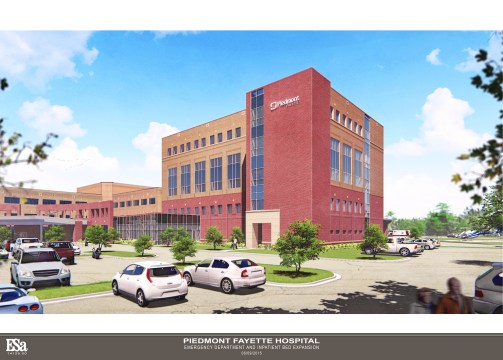Piedmont Fayette Hospital is expanding its emergency room capacity to keep up with Fayette County’s growth and rising patient numbers.
The $40 million project will also add more beds to the hospital, located in Fayetteville, south of Atlanta.
More than 61,000 patients were treated in the hospital ER last fiscal year, but Piedmont Fayette officials expect the number to exceed 67,000 this year.
“We’re at capacity now, and this will help us better serve our patients,” CEO Michael Burnett said last week. And he announced that the hospital wants to add even more capacity in the near future.
Many Georgia hospitals are reeling financially from the high costs of uncompensated care, because they are treating so many uninsured patients.
But Piedmont Fayette is in a far different position. It’s in one of Georgia’s most prosperous counties. Median household income in Fayette County is almost $80,000, versus $49,000 statewide, according to Census figures. Fayette’s uninsured rate is 13 percent, compared with 21 percent statewide. That means a higher rate of people with private or government coverage.
A few other large hospital projects are occurring in the state. They include Columbia County, near Augusta, where health systems are vying to build the county’s first hospital. Northeast Georgia Health System, based in Gainesville, recently opened a new hospital in nearby Braselton.
The Piedmont Fayette Hospital project stands in stark contrast to the situation in neighboring Clayton County, where Southern Regional Medical Center is in severe financial trouble. Southern Regional, dealing with a high uncompensated care burden, is in danger of closing its doors, which almost certainly would lead to more ER patients in Fayette.
One way to help cover more uninsured residents would be to expand the state’s Medicaid program under the Affordable Care Act. But Georgia is one of the states that have rejected such a move. Gov. Nathan Deal and legislative leaders say it would be too costly.
Suburban areas, containing affluent markets, can offer better opportunities for hospital projects, said Chris Kane, a consultant with DHG Healthcare. Still, Kane added, such expansions and new construction are not a sure route to hospital income growth. “It’s a high-wire act, getting capital expenditures and operating margins in sync.”
Besides the ER expansion, the Fayette project will convert semi-private rooms to private rooms. The second-floor additions will include in-room dialysis, medical surgery beds and observation beds, and beds will be added to the third floor, including four new patient-family suites.
Burnett also announced plans to amend the hospital’s certificate-of-need license to include a fourth and fifth floor during the current construction phase. The proposal would bring the total cost to $57 million.
“This expansion helps us serve our population, and we are actively recruiting additional physicians, nurses, and other allied health professionals to grow our workforce along with our hospital,” Burnett added.
The ER expansion is expected to be complete next summer. The second and third floors will be completed in autumn 2016, raising the hospital bed capacity from 172 to 189.


